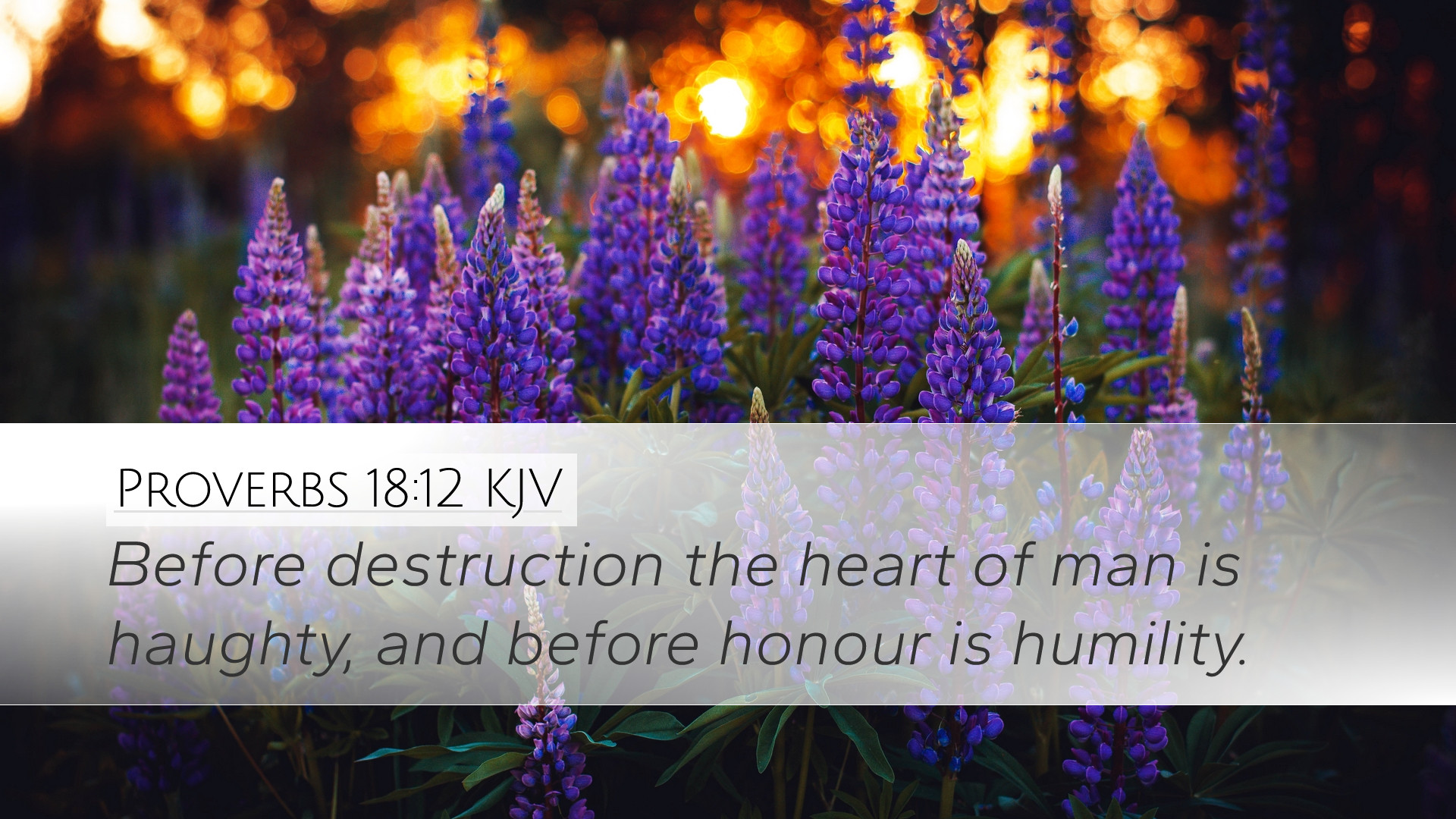Commentary on Proverbs 18:12
Verse: "Before destruction the heart of man is haughty, and before honour is humility." (Proverbs 18:12)
Introduction
This passage from Proverbs serves as a profound reminder of the spiritual principles governing humility and pride. It juxtaposes the consequences of a haughty heart with the rewards of humility, providing insights that are crucial for personal character development and leadership in the faith community.
Insights from Matthew Henry
Matthew Henry emphasizes the importance of humility as a precondition for honor. He observes that the heart filled with pride is often blind to its own faults and vulnerable to eventual downfall. Henry states, "Pride goes before destruction; and a haughty spirit before a fall." He notes that the rising of one's heart through pride often precedes a decline in status or respect, suggesting that God opposes the proud but provides grace to the humble (James 4:6).
In his commentary, Henry elaborates on the necessity of maintaining a humble spirit, especially for those in positions of authority. He argues that true leadership is characterized by servitude and a recognition of one’s limitations, calling to mind the example of Christ, who epitomizes humility.
Insights from Albert Barnes
Albert Barnes identifies this verse as a critical reminder of the connection between pride and fate. In his interpretation, he asserts that "the haughty heart" often becomes a prelude to ruin, suggesting that self-exaltation invites ruin upon oneself. He emphasizes that "Honour is preceded by humility," making clear that those who seek to elevate themselves often find that their efforts result in their own destruction.
Barnes ties this concept to a broader theological understanding, explaining that humility is a pathway to divine favor and blessings. He posits that those who submit to God’s will and acknowledge their dependence on Him are the ones whom He raises up. The moral here is clear: individuals should cultivate a humble disposition to attract honor from God and others.
Insights from Adam Clarke
Adam Clarke elaborates on the dynamics of pride and humility by analyzing the psychological aspects of human behavior. He states that a proud heart leads to overconfidence, which ultimately results in a significant fall. Clarke notes, "When a man is elevated in his own estimation, he is on the edge of destruction." This proclamation serves as a counsel against self-deception.
Clarke also asserts that humility, in contrast, prepares the heart for receiving honor. He highlights that the biblical understanding of honor is tied not to society's accolades but is associated with God’s recognition of character and morality. He encourages readers to embrace humility as a trait that synchronizes with a life of integrity and virtue.
Theological Reflections
This verse encapsulates foundational Christian virtues that resonate through both the Old and New Testament narratives. The thematic focus on humility is echoed in the teachings of Jesus, particularly in Matthew 5:3, where the meek are pronounced blessed. Across scripture, the divine preference for the humble is consistently reinforced.
- Pride as a Gateway to Sin: The assertion that "before destruction the heart of man is haughty" illustrates the danger of pride as a precursor to various forms of sin and folly. This understanding compels believers to examine their hearts regularly, seeking to root out pride and replace it with a spirit of humility.
- Humility Preceding Honor: The juxtaposition of destruction and honor invites pastors and leaders to reflect on their motives and approaches to leadership. The need for humility among those in ministry is paramount; Biblical history is filled with examples of leaders who fell from grace due to pride.
Practical Applications
Given the depth of this verse, several practical applications may be drawn for ministry, personal growth, and community life:
- Self-Examination: Regular introspection regarding personal pride and the place of humility in one's life should be encouraged within church communities.
- Shared Leadership: Encouraging collaborative ministry teams can foster an attitude of humility, reminding leaders that true greatness comes through serving others.
- Teaching on Humility: Sermons and Bible studies focusing on humility to highlight its critical importance in the Christian walk can cultivate a culture that honors God.
- Modeling Behavior: Those in leadership should model humility in their daily lives, demonstrating that honor is derived from serving rather than seeking self-interest.
Conclusion
Proverbs 18:12 serves as a vital reminder of the spiritual truth that precedes personal and communal integrity, urging believers to pursue humility as a pathway to God’s honor. The insights from Henry, Barnes, and Clarke collectively reinforce this message, providing a rich foundation for understanding the interplay between pride and destruction, humility and honor.


